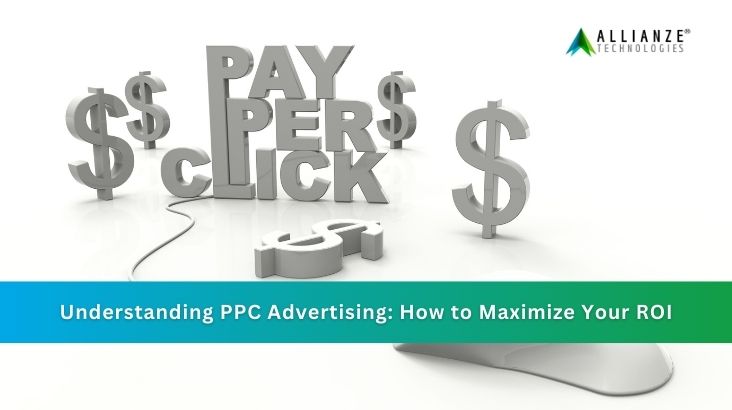We are living in a world where every click counts, and are you making the most of yours? As the competition in the digital field is constantly rising, it’s becoming difficult to captivate the attention of users, drive targeted traffic, and convert clicks into customers. Therefore, businesses are increasingly relying on Pay-Per-Click or PPC advertising as a strategic solution to enhance visibility and increase their return on investment (ROI) faster. Even though PPC advertising possesses huge prospects, some businesses find it harder to maximize ROI in PPC. This is mainly due to their lack of knowledge or strategic planning.

In this blog, we are going to break down the vital factors of a successful PPC campaign and the ways to maximize ROI through diverse strategies.
What is PPC and How Does It Work?
PPC advertising is a kind of digital marketing where businesses bid on keywords to publish their ads to potential customers. A major advantage of PPC is its cost-effectiveness. Because the advertiser is only required to pay the fee when someone clicks on their ad rather than paying a flat fee. This advertising model provides instant and better visibility for businesses, making them appear on top of the search engine result pages (SERPs) or on platforms like Google Ads. When compared to organic strategies, a PPC campaign provides faster results.
How does it work? PPC advertising works when a user searches for a keyword that matches the advertiser's keyword. Then the advertisers who have placed bids on that particular keyword have to participate in an auction. The one who wins the auction can display their ads, and when someone clicks on it, the advertiser has to pay the cost per click.
The Base of a Successful PPC Campaign
A strong foundation is essential when you create a successful PPC ad campaign. This can begin with understanding the targeted audience. Also understand their concerns, preferences, and online behavior. Secondly, keyword research, it is the core of PPC campaigns. You can find proper keywords using tools like Google Keyword Planner. Remember to choose relevant keywords and avoid using vague or broad terms that result in wasted clicks Finally, craft ad copy that communicates directly to your customer’s requirements. Also, add a strong and compelling call-to-action (CTA).
Below is a PPC checklist for a successful ad campaign:
- Establish clear objectives for lead generation, sales, and brand awareness.
- Research and choose high-intent keywords.
- Craft a clear and action-driven ad copy.
- Plan a budget that meets with your goals and industry.
Bidding Strategies, Choose the Right One
Once your campaign is established, you have to select a bidding strategy. It has a vital impact on maximizing your ROI.
Manual vs. Automated Bidding
Manual bidding gives full control by enabling you to set your maximum Cost-Per-Click (CPC) for every keyword. On the contrary, automated bidding employs Google’s algorithms to change your bids instantly depending on the performance.
Bidding to Maximize ROI
One has to find the proper balance between bidding high and remaining competitive without overspending. Bidding low may cause your ad not to appear frequently. Also, when you bid high, the Pay-per-click can use up your budget quickly.
Advanced Bidding Techniques
Enhanced CPC and Target ROAS (Return on Ad Spend) are two advanced bidding techniques. Enhanced CPC changes bids depending on the probability of a conversion. Target ROAS, automatically sets bids to attain a distinct return on your investment.
Crafting Effective Landing Pages for PPC
When the user clicks on the ad and lands on a page that doesn’t match the intent of the PPC ad, you may lose potential customers. Therefore, having an optimized landing page is significant. The following are core factors to consider for a high-converting landing page.
- Clear and Compelling CTA – Motivate users to make immediate decisions.
- Mobile-Friendliness – Ensure that the page is optimized for mobile devices.
- Fast Loading Times – Page speed influences conversion rates.
Measuring and Optimizing PPC Performance
In order to analyze the performance of your PPC campaign, you are required to track the right metrics appropriately. Below are some of the key metrics to track.
- Click-Through Rate (CTR) – measures the percentage of clicks on your ad.
- Conversion Rates – Percentage of people purchased or signed up.
- Cost Per Conversion – The overall expense of your PPC campaign categorized by the number of conversions.
- ROI in PPC – Compares the cost you spend on ads to the generated revenue.
Google Analytics and Google Ads are two tools that offer comprehensive insights into PPC analytics and campaign performance. This tool helps in tracking key metrics, monitoring conversions, and identifies areas requiring enhancements.
Avoid the Common Pitfalls in PPC Advertising
Overbidding on Keywords
Bidding high will consume your budget easily. Therefore, you have to maintain a balance between cost and competition.
Ignoring Negative Keywords
Assist in sorting out insignificant traffic. Avoiding this results in unwanted clicks and wasted spending.
Skipping Regular Campaign Reviews
The campaign requires frequent reviews and adjustments. Lacking regular monitoring leads to overspending and missed opportunities for optimization.
Make Every Click Count
A well-established strategy is essential to increase ROI in PPC. This combines understanding your audience, maximizing smart bidding strategies, enhancing landing pages, and employing data to refine your campaigns. Through regular testing and enhancement, you can make sure that every click counts and that your PPC advertising efforts offer the best outcome.
Let’s increase your PPC ROI today with our effective and expert strategies. Connect with us at [email protected] to know more.
